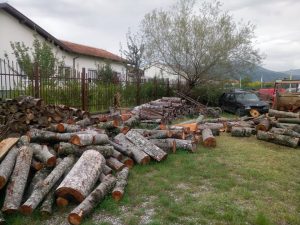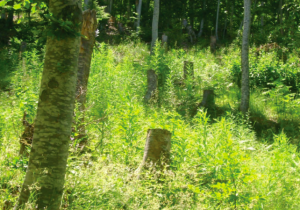Due to indescribable negligence, flora at the Sharri National Park has been targeted by criminal groups for many years now, endangering thousands of hectares of forests.
Baton Isniqi
In recent years, endless piles of confiscated logs have covered the front yard of the Directorate for the Administration of the “Sharri” National Park, a perfect visual metaphor for the state of nature in the park, which is at the mercy of the saw and the ax.
 Photo: Piles of wood confiscated in the yard of the Directorate for Administration of the National Park “Sharri”
Photo: Piles of wood confiscated in the yard of the Directorate for Administration of the National Park “Sharri”
The Law on Nature Protection prohibits the logging of trees, as well as all other economic exploitation of natural resources, in the “Sharri” National Park due to its status as a protected area.
According to Bajram Kafexholli, the Director of the Directorate for the Administration of the “Sharri” National Park, logging is allowed only in sanitary or cleaning cases, such as when trees are sick, rotten, dry, distorted or block the road, while the wood mass from these sanitary and cleaning operations is dedicated to meeting the needs of the local community for firewood.
However, every year, hundreds of cubic meters of wood are confiscated from tractors and trucks by the authorities. Considering the relative effectiveness of the guards and the police, it also is easy to assume that much of the illegally cut wood escape their eye and passes unnoticed to its destination. Regardless, according to figures obtained by KOSID, over 350 lawsuits have been filed against illegal loggers who have been caught cutting wood within the Park between 2016 and 2019.
Organized crime groups conducting illegal logging in the “Sharri” National Park represent a serious threat and even risks that certain areas lose the values for which the park was originally protected. Under Kosovo legislation, if an area no longer possesses these values such as unique flora and fauna, then its status as a protected area is removed
In an environment rich in flora and fauna, over 35% of the “Sharri” National Park, or over 18,000 hectares, is covered by forest, with Beech forests the most widespread, particularly the species Fagetum montanum and Fagetum subalpinum. It is these forests that are most in danger from human intervention.
The Law on “Sharri” National Park, adopted in 2012 by the Assembly of Kosovo, defines the park as covering an area of 53,469 hectares and falling within the territory of the five following municipalities: Kaçanik (4.1%), Strpce (23.9%), Suhareka (4.7%), Prizren (22.2%) and Dragash (45.1%).
However, despite such a large area, the Directorate for Administration of the Sharri National Park is unable to meet the number of guards outlined in the “Sharri” National Park Management Plan, in part due to a lack of budget. The staff at the Directorate also believes that Kosovo’s institutions are not on their side, pointing to cases in which individuals with ongoing court cases for environmental law violations have been hired in public bodies.
A report by the Kosovo Agency for Environmental Protection covering 2011 and 2012 described the environmental situation in the “Sharri” National Park as “not good”, due to considerable damage to forests, especially in the municipalities of Strpce and Kacanik.
At that time, the area of the park in the municipality of Strpce was managed by Serbian parallel structures, while territory in Kaçanik was managed by Kosovo institutions.
In 2013, the parallel institutions left the municipality of Strpce, and from that year, the park’s territory within the municipality of Srtrpce has been managed by the Directorate for the Administration of “Sharri” National Park. However, according to data published by the Kosovo Agency for Environmental Protection, it is still these two municipalities that have continued to experience the biggest problems with illegal logging.
 Photo:Illegal deforestation in “Sharri” National Park
Photo:Illegal deforestation in “Sharri” National Park
In an analysis made by the Kosovo Civil Society Consortium for Sustainable Development (KOSID), forest protection officials stated their conviction that organized criminal groups conduct illegal logging operations in the territory of the park in Kaçanik. The officials even claimed that the groups hired individuals to track forest guards and police officers in order to ease operations.
Experts fear that leaving the fate of the Park to the mercy of these groups will disfigure the natural beauty of Kosovo. Behgjet Mustafa, Professor of the Department of Biology at the Faculty of Mathematics and Natural Sciences at the University of Prishtina believes that the damage the environment is suffering due to illegal logging is incredibly harmful.
Mustafa adds that if logging continues at the current pace, then the “Sharri” National Park will lose its value as a nature reserve, which would lead to the loss of its status as a protected area.
Baton Isniqi is a biologist and environmentalist. Currently, he is the Coordinator of Environmental Policy Projects at the Kosovo Civil Society Consortium for Sustainable Development (KOSID).
The publication was done within the project “Protected Areas for Nature and People II”, implemented by WWF Adria, with the support of the Swedish International Development Cooperation Agency (Sida).
The views and opinions expressed in this publication are those of the authors and do not necessarily reflect the official policy or position of WWF, Sida or any other organization.
